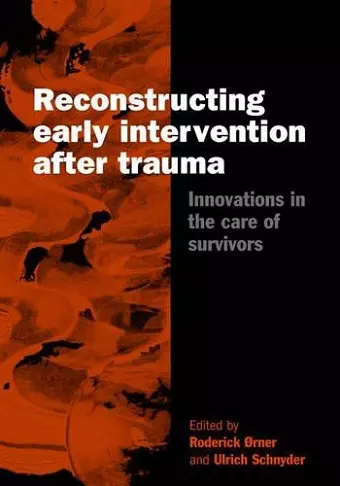Reconstructing Early Intervention after Trauma
Innovations in the Care of Survivors
Ulrich Schnyder editor Roderick Orner editor
Format:Paperback
Publisher:Oxford University Press
Published:15th May '03
Currently unavailable, and unfortunately no date known when it will be back

The introduction of a diagnosis of Post Traumatic Stress Disorder in the 1980 edition of the American Psychiatric Association's Diagnostic and Statistical Manual for Mental Disorders heralded the dawn of modern psychotraumatology. On the strength of the conceptual refinements offered by this new diagnosis, much consideration has been given to the challenge of effecting early intervention after trauma. To do so offered the prospect of preventing initial reactions developing into a debilitating chronic disorder with complicating co-morbidities. Some of the original proponents of early intervention protocols have continued to claim that such provision will mitigate the effects of traumatic events, prevent the onset of a traumatic stress syndrome, allow early detection of those who may require further help and help re-establish a homeostatic equilibrium. The evidence base for making these claims has never been made explicit. More recent clinical trials suggest a more qualified position ought to be taken with respect to what should reasonably and reliably claimed for early intervention techniques used to date. More alarming is the growing cluster of studies warning against certain types of intervention. The optimism which once prevailed with respect to what early intervention after trauma might achieve has, in recent years, been replaced by controversy and defensively entrenched posturing. This book aims to provide a comprehensive update on the accumulated experience in the field of early intervention after trauma and defines standards for service provision. It does so by reviewing the historical traditions and theoretical foundations for early interventions and links recommendations for psychological first aid to a substantial body of multidisciplinary evidence. The ultimate aim of this book is to reconstruct an informed evidence base for early intervention after trauma.
I first heard about the book when it was launched at the ESTSS Conference in Berlin in 2003. Any hot-cakes stall would have been proud to have sold their wares as speedily! . . . The book . . . is a good read for those who have to look after trauma survivors and I would recommend it. * Psychological Medicine, 35 *
. . . this text provides a comprehensive overview of the existing empirical status of early psychological intervention following trauma. The early intervention literature is characterized by controversy and inconsistent findings, yet the editors have managed to arrange chapters reporting an array of approaches and views in such a way as to provide the reader with a clear overview of this complex area. This text is an essential read for clinicians working with traumatized clients, whether in a clinical or medico-legal capacity, and an invaluable summary of the most up-to-date empirical findings for researchers in the traumatic stress field. * Behavioural and Cognitive Psychotherapy, Vol 24 *
ISBN: 9780198508342
Dimensions: 240mm x 166mm x 17mm
Weight: 483g
300 pages